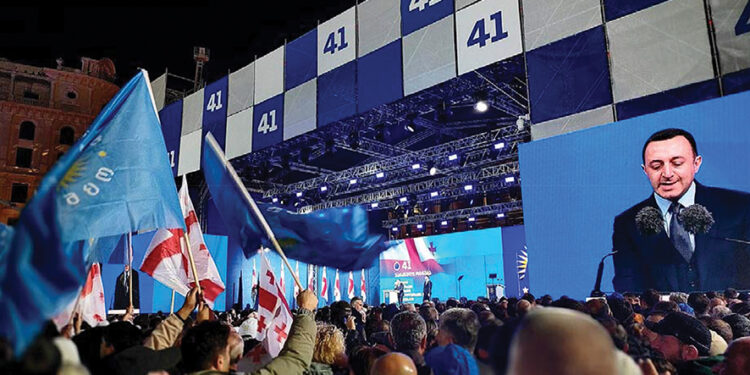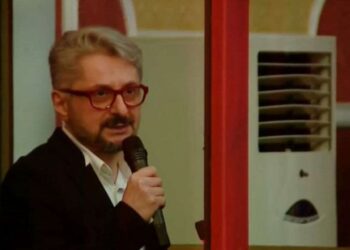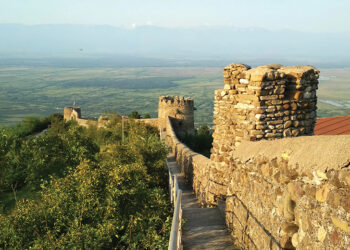OP-ED by Paul R. Grenier for landmarksmag
In early June 2025, I traveled to Georgia to attend the Tbilisi Forum on Peace and Sustainable Development. My only previous visit to Georgia had taken place in the mid-1980s, when it was still a republic within the USSR. I was curious about many things: how much it had changed, how its culture was holding up, what was the truth about the protests and the political situation there more generally.
When I arrived at the Tbilisi airport I was taken directly to the Iota Hotel, located a few blocks from Liberty Square, though I would later transfer to the nearby and more luxurious Paragraph Hotel, where the conference was to take place. Odd as it may seem, I found my time in the Iota Hotel to be an extremely important part of my experience of Tbilisi. The hotel has certain qualities and virtues that point, potentially, to a better future for Georgia as a whole.
Iota’s interior design has nice, clean lines and an absence of decorative clutter – in other words, it is modern. At the same time, the pervasive use of wood, metal and stone, along with the hotel’s balanced, human-scale proportions, lends to the whole a rooted, classical feel. A few steps from the reception desk one comes across a well-lit staircase with wide, stone steps bordered by a weathered steel banister. I nearly always took this attractive staircase, instead of the nearby elevator, to my fourth-floor room. A modern building design that recognizes that people have legs! Who would have thought!
At breakfast time, the hotel restaurant puts out plates of local fresh fruits, berries and cut vegetables; local fresh-made breads, traditional milk products, a simple lobio (a Georgian salad made with beans), plus the usual omelets and coffee, among much else. Everything one actually needs, but also nothing that one does not need (for example, no annoying American pop music). The many local products brought to mind the relationship between a thriving city and its nearby more or less self-sufficient, diversified farmers (or ‘peasants’ in the language of J.S. Mill and even Simone Weil). It is also this kind of symbiotic relationship between the city and its rural periphery that the urbanist Jane Jacobs emphasized as the key to an economic life oriented to human well-being. Later in my visit I was delighted when a young member of the Georgian Dream party asked me if I knew about Jane Jacobs.
When I stopped by the Iota Hotel restaurant one afternoon to get myself a cup of tea, I happened to notice water on the floor. The large-ish puddle was right in front of the hot drinks counter at a spot where customers were likely to walk. I pointed the puddle out to the staff member standing behind the counter.
He nodded, adding: “Yes, I know,” but made zero move to clean it up. I found his refusal to be rushed – aside from being hilarious – relaxing. Apparently, people don’t rush around here all the time like us Americans. Our first thought would have been: there’s a lawsuit waiting to happen! His thought must have been: ‘Any fool can see that there is a puddle on the floor, they’ll walk around it.’ I think it is the Greek Orthodox theologian Timothy Patitsas who has written a lot about the centrality of καιρός, or ‘unhurried time,’ in a rightly ordered city.
The City
When I visited Tbilisi in the mid-1980s, i.e., during the waning years of the Soviet Union, I genuinely fell in love with the place. I decided it was the Italy of the USSR. The wine, the outdoor cafes, the feeling of comparative abundance, the hospitality, and, most of all, the happiness and warmth of the many people I met, it was all irresistible. What I recall of the city center was a charming mixture of Eastern and Western (Baroque and Rococo) architectural styles. If there were any gray Soviet-era buildings in the mix, they didn’t stand out.
Today’s Tbilisi has more wealth than back then, and certainly more cafes and small shops – all of which is to the good. The charm of the old skyline is now marred, to my taste, by a few incongruous modern buildings wrapped in reflective black glass.
Tbilisi has a great many churches, many of them ancient. A professor of philosophy at the university of Tbilisi, with whom I spent a very pleasant afternoon walking around the old town, explained to me that all, or nearly all of these churches are now functioning and well attended.
Modern Tbilisi also contrasts with its Soviet-era version by being more materialistic. Expensive western name brand stores occupy the prominent spots downtown. The Paragraph Hotel where I stayed during the conference, though impeccable and extremely hospitable, was luxurious almost to the point of excess (the toilet seat in my room looked like the control panel of a fighter jet and I never figured it out – I was afraid to even touch it). I noticed many drivers showing off by speeding around in their fancy cars. One comes across the ‘massage’ parlors and drinking establishments typical of many American city centers.
A high point for me during my stay in Tbilisi was seeing the opera Daisi (Sunset) in the stunning Moorish-style opera house on Rustaveli Avenue. Not since viewing Mussorgsky’s Boris Godunov at St. Petersburg’s Marinsky Theater have I so enjoyed an opera! The music by Paliashvili, the staging, dance, singing, the story – all were of stunningly high quality and very moving. The themes in Daisi overlap, to a certain extent, with those in Godunov. In both, tragedy and foreign invasion transpire against the backdrop of a profound and enduring Orthodox Christian faith.
Conference, Conversations
Since I’ve chosen the ‘notes from a diary’ genre as the format for these reflections, I will restrict myself to sharing only a few of my own contributions to the Tbilisi Peace and Sustainable Development conference. I won’t attempt any kind of overview. A proper treatment of this impressive conference, in both its formal and informal sessions, would require writing an entire book. Suffice it to say that I was thrilled to be in the company of scholars from all over the world that I greatly admire, and thrilled to get the chance to meet some of them – for example Alexander Mercouris, Ian Proud, Amb. Jack Matlock, and Glenn Diesen – for the first time in person.
The central theme of my presentation during the conference was liberalism’s hostility to the idea of limit. The ‘liberalism’ to which I was referring, I tried to make clear, is an ideology to which virtually all Americans belong, regardless of whether they think of themselves as being on the left or on the right (a point about Americans emphasized, incidentally, by the philosopher Alasdair MacIntyre, author of the seminal work After Virtue). The so-called neocons, I said, are not, as some suppose, a fringe movement, and they are certainly not Marxists. They are, to the contrary, liberals. What sets them apart is their militancy as liberals. Were the neocons to be somehow miraculously excised from the American body politic, the idea of limit would not of itself reappear, and neither would the idea of ‘restraint.’ Why else would there be such unanimity in the US Congress, and in the mainstream US press, in support of every new war? Sadly, neoconservatives are flesh of flesh of America’s liberal civilization, and in their eagerness to destroy every rival civilization, the neocons differ only in degree from the rest of the American mainstream.
My explanation as to why liberalism as an ideology rebels against limits went something like this. Liberalism, firstly and most importantly, reverses the traditional relation between means and ends. For liberalism, means themselves have become the end. But a means, as already Simone Weil noted, by definition has no limiting principle.
Now, this whole matter of means and ends causes much confusion and helps explain why so many are convinced of an organic linkage between Marxism/Trotskyism and the neocons. Trotskyists, we know, justified the use of evil means in pursuit of their (Marxist, utopian) ends. To be sure, liberalism, like Trotskyism, is a revolutionary doctrine, but its revolutionary spirit stems from its own distinctive ethical stance – the one I just described, which pursues the unlimited increase of means. These ‘means’ may take various forms: money, military force, rhetoric. The salient fact is nonetheless that liberalism ultimately transforms everything, including every good thing, into a means. Lately, it has been also transforming entire countries into such means.
At the conclusion of my short presentation, I made mention of D.C. Schindler’s book, Freedom from Reality, as an excellent source for anyone interested in digging deeper. I tried to share an insight from Schindler about how the liberal re-definition of freedom (which re-definition is what ultimately explains liberalism’s reversal of means and ends) can easily transform each of us from within, as it were, at the subconscious level. If that is true, then this means that the effort, in Georgia, to protect its national cultural legacy and traditions must not be viewed merely as a matter of protection from external foes. The quest to remain Georgian also entails carrying out an honest examination of one’s own philosophical presuppositions. Those who, in 1991, were leaving behind communism, the architect Christopher Alexander once noted, may have thought that they were gaining freedom. What they were entering in fact was “a money-centered world.”
After my presentation, I had the good fortune of making the acquaintance of a Georgian professor of philosophy, we shall call him “N,” who approached me to learn more about the book by D.C. Schindler I had mentioned. We struck up a conversation and ended up, several days later, walking around the city together, all the while discussing our mutual interests. At the outset of our walk, we stopped by a bust of the Russian poet Alexander Pushkin which stands in a park near the Paragraph Hotel. I asked if there was any chance that it would be removed, as has happened recently in Ukraine, as a way of ridding the county of ‘Russian influences.’ “None whatsoever,” was his reply.
N. mentioned that he was struck by an answer I had given in response to the question an audience member had asked about how Georgia, a country for whom the Orthodox Christian faith is central to its identity, could find a place for itself in a wider world which views Orthodox Christianity as something alien. In my response, I suggested as a model the concept of Europe as it was understood by the founder of Russian philosophy, Vladimir S. Solovyov (1853 – 1900). The Russian philosopher held that the idea of Europe, in its essence, is constituted by the combination of Christian revelation and Greek reason. The former instantiates the concrete good in its fullness by means of a revelation, in other words, in the person of Christ. The latter, because it speaks a philosophical, rational language, is accessible to all. I also put in a good word for Simone Weil who, in her writings, insisted that Greek thought was a premonition of the Christian revelation.
“A Europe so defined,” my new friend told me, “is exactly what attracts us to Europe, and it is in this sense that we have always thought of ourselves as Europeans.” This is why Georgians like him are attracted to European literature, including secular literature, which they have always associated with something sane and reasonable. And, of course, Georgians had long assumed that their deep roots in Christianity also signified that they have a rightful place in Europe. It is only recently, he noted, that these same roots of Georgian culture have suddenly been viewed, first of all by the Europeans themselves, as something allegedly outside of and in contradiction with what is still called ‘Europe.’
Continued in next week’s GT.
First published on landmarksmag. Reprinted here with permission from the author.
OP-ED by Paul R. Grenier for landmarksmag














